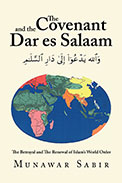
 |
The Covenant and the Dar es Salaam: The Betrayal and the Renewal of Islam's World Order
by Munawar Sabir
Trafford Publishing
Author Sabir focuses on the basic teachings of Islam, distinguishing them from a multitude of misinterpretations that have developed, especially in the last two hundred years. He cites seventy-five verses from the Koran, each beginning, "O you who believe!"—a clear call to follow Allah's exhortations, such as to meet in secret only for righteous purposes, and to recognize that there are priests and clerics who deal in falsehood and will be punished. Christianity first declared war on Islam in 1095, when Pope Urban II spurred a crusade to reclaim holy lands, initiating an ongoing conflict. Sabir cites the cataclysm of 9/11 in detail, making a compelling case for the collusion of Islamic and American leaders in that event and its disastrous aftermaths. He notes that Muslims have waged war on their own brethren, impelled by greed and sectarianism. He invites readers to examine Islam's past so that the conflicts and contradictions of the present day can be better understood, invoking a return to fundamental koranic precepts.
Sabir, a fellow of the Royal College of Physicians and Surgeons of Canada, has come to his vibrant findings regarding religion after diligent study of the Koran and the history of Islam. He brings to bear scientific and theological knowledge, all with the aim of reaching those who share his faith but may have come to accept what can be considered an un-koranic version of it. The "Dar es Salaam" of the title references an "abode of peace" that may be found by individuals willing to contemplate the Koran with open minds and hearts. The solution to all internal and external conflict is, and has always been, adherence to each individual's din, or commitment to submit to Allah's will, emphasized in koranic verse and explicated here by Sabir for a modern readership.